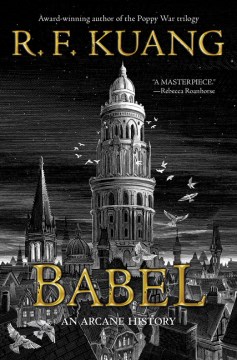Babel: An Arcane History by R.F. Kuang

Babel is an extraordinary book: It is outstanding in its intelligence, precise prose, and undeniably new and creative system of magic. It is the story of the fall of the Tower of Babel at Oxford University and, perhaps, the beginning of the fall of the British Empire and the reign of the English language.
The Tower in the book is the Royal Institute of Translation, standing at the center of Oxford University in 1828. Its exalted students learn the theory of language, the art of translation and, ultimately, the use of translation in magic. In this world, magic occurs in the gaps between the shades of meaning of the same word in two different languages, inscribed on each side of a bar of silver. To find the word pairs and activate the magic, an intimate knowledge of both languages is mandatory.
Babel is the story of Robin Swift, born in Canton, China and brought to England by a stern, distant guardian after the death of his mother. He joins three other brilliant and obedient young people who have shown an ability to learn the important languages—Greek, Latin and English—along with their own native tongue. The British Empire is expanding its boundaries and, together with trade alliances and all the world’s silver, it is scooping up languages. The successful few magician translators at Oxford can enjoy all the comforts of empire.
But Robin and his friends—two foreign men and two women—will never be truly accepted into society, despite their standing as student magicians. They also might not want to be a part of the system that trained them, no matter the benefit to themselves. They must learn the truth of the phrase, “An act of translation is always an act of betrayal.”

I loved this book. It was one of the most compelling reads I have experienced in quite some time. FWIW, our household members are American English speaking natives, but have lived and gone to schools in Japan and China, as well as studied Latin, French, Italian, and German. My appreciation for what R. F. Kuang has illustrated in “Babel” knows no bounds. The art and literal magic of translation, and all it truly represents, is in good hands. I hope for more work in R. F. Kuang’s universe. Thanks for sharing. I am a better person for having read this book. It will widen your world if you let it.